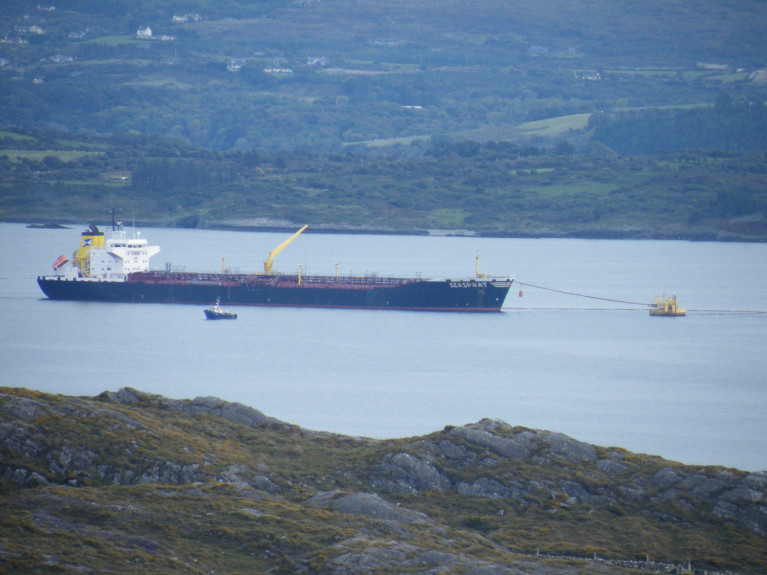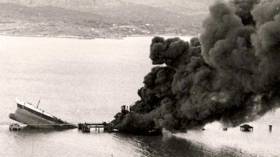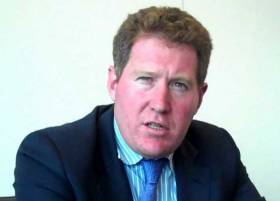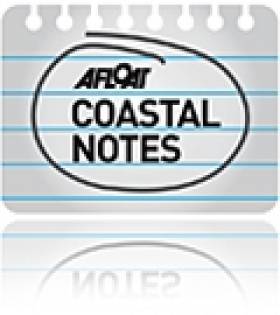Displaying items by tag: Whiddy Island
The Attorney General’s office has been in contact with relatives of the 50 victims of the 1979 Whiddy Island Betelgeuse tanker explosion amid calls for a new inquest.
As The Irish Independent reports, the Attorney General’s office has written to the French-Irish Association of Relatives and Friends of the Betelgeuse (FIARFB).
It is understood that it is seeking clarification about documentation and further details of potential new witnesses and new information that arose after the original inquests on July 12th, 1979.
Taoiseach Leo Varadkar confirmed to maritime lawyer Michael Kingston and FIARFB last year that he was forwarding all documentation about requests for new inquests to the Attorney General’s Office.
Mr Kingston lost his father Tim in the disaster 45 years ago, when the oil tanker Betelgeuse caught fire and exploded at Whiddy island in Bantry Bay, west Cork, on January 8th, 1979.
The newspaper reports that a formal review of the evidence is now underway to determine if a new inquest or new inquiries are justified.
Mr Kingston has been able to inspect the original inquest files after a lengthy campaign and said the case for new inquests was overwhelming.
Read The Irish Independent here
Families Call for Fresh Inquests into Whiddy Island Disaster
A call for fresh inquests into the deaths of 50 people in the 1979 Betelgeuse tanker explosion on Cork’s Whiddy Island has been made by international maritime expert Michael Kingston.
Kingston, whose father Tim died in the explosion, has written to the Taoiseach Leo Varadkar on behalf of the victims’ families.
Speaking on RTÉ Radio 1’s Sunday with Miriam programme, Kingston and his mother Mary claimed the deaths were unlawful due to “monumental regulatory failures” by the State in the lead-up to the disaster.
In the interview, Michael, and his mother, Mary, explain the circumstances of family life, with Tim Kingston, and the immense emotional consequences for their family, and the other victims’ families, of the disaster, and its aftermath. This was also echoed by former president Mary McAleese.
In the correspondence with Taoiseach Leo Varadkar, copied to Minster Eamon Ryan and Paschal Donohoe, as successive Ministers for Transport, the families demand that the Taoiseach “direct Ireland’s Attorney General to order new inquests under Section 24 of the Coroner’s Act 1962”, Kingston said.
This was due to the “unreliability of the inquests on 12th July 1979 and 15th February 1980”, he said.
He said that having located the inquest file at the Co Cork Coroner’s Office, two witnesses, John Connolly and Bruce Tessyman, who provided statements to the inquest to establish the circumstances and timelines for the disaster in the lead up to the deaths, were subsequently proven to have fabricated the truth in the 1980 Whiddy Island Tribunal Report.
As the inquests are “unreliable”, the Attorney General is “obliged” to order new inquests, he said.
Kingston also states that the Government had ordered the Co Cork Coroner to destroy the file, which he refused to do. Mr Kingston also explains that further evidence of malpractice by some Gulf Oil employees on the island had emerged in 2022.
Kingston referred to two reports that the Department of Transport had “buried”, he said. One is by barrister Roisin Lacey of August 2010, and one by Captain Steve Clinch of July 2021 that conclusively shows that Ireland has been in deliberate breach of international regulation, and European regulation.
Repeating what he said on Sunday with Miriam, Mr Kingston said this was a “ doubling down on grief, by utterly disrespecting the lives that were lost in 1979 for similar Department of Transport failures, when we should never again make such errors”.
He asked the three ministers to “own up to the failure and publish the reports”.
The families have demanded a public enquiry into these on-going regulatory failures in the public interest and safety, following what they state has been “the most gross display of deliberate failure, causing death, that the Irish State has ever seen”, he said.
Families of Whiddy Island Betelgeuse Victims Seek State Apology in New RTE Doc on One
Relatives of the 50 people who died in the Whiddy island Betelegeuse tanker explosion 42 years ago are seeking an apology from the Government for “appalling failures “
The call has been made in a new RTE Documentary on One programme on the disaster in Bantry Bay, West Cork, which is due to be broadcast this weekend.
International maritime lawyer Michael Kingston said his father, Tim, was one of 50 people who died in “atrocious circumstances” where “no rescue took place” due to “catastrophic safety failures” in the early hours of January 8th, 1979.
Interviewed on RTE Radio 1’s Morning Ireland, Kingston said his father was “determined to have died by accidental drowning”, when “in fact he died because of unlawful breaches of regulation”.
He said that families had never received a State apology for the "appalling regulatory failures".
 The Betelgeuse, broken in two leaving 50 Irish, British and French citizens dead
The Betelgeuse, broken in two leaving 50 Irish, British and French citizens dead
He said the families appeal in the documentary for the Government to "show decency and....issue that apology for the appalling failures in administration of justice and failure to implement regulation".
Kingston, who is vice president of the French Irish Association of the relatives and friends of the Betelguese, said families of the French, Irish and British victims who died that night have had to live with the fallout, with "no resolution".
The Documentary on One by Michael Lawless and Donal O’Herlihy includes an interview with former president Mary McAleese, who was working as an RTÉ reporter at the time, and fireman Brendan O’Donoghue who has never previously spoken about the fire.
It is due to be broadcast on Saturday, October 2nd at 2 pm and Sunday, October 3rd at 6 pm on RTE Radio 1 here
Bantry Bay Port Bucks Trend With 81% Trade Jump
Bantry Bay's busy port traffic to and from the national oil reserve facility at Whiddy Island, has led to the port recording a strong performance last year, despite its sister port, Port of Cork, seeing trade falling 2% to 9.2m tonnes last year.
As the The Southern Star reports, the Bantry Bay Port Company, by far the smaller ‘sister’ port, saw its total traffic jump a massive 81% to 1.3m tonnes, compared to the previous year.
The overall Port of Cork dip is a direct result of the challenges posed by Covid-19, and the cancellation of cruise calls in particular.
But a spokesperson for both companies said the strong Bantry result could be attributed to ‘increased traffic movements to and from the National Oil Reserve’.
‘We also saw a surge in the need for oil storage,’ the spokesperson added. Click for more here
Also in Bantry Bay, Afloat adds off scenic Glengariff is where anchorage visits of cruiseship classic Marco Polo were highlighted and also recalled.
The south-west port had 16 cruise calls scheduled including Marco Polo (May) last year, however Covid put an end to that including its operator Cruise & Maritime Voyages.
Due to the pandemic's dramatic affect, the UK operator CMV went into adminstration, which would lead to a knock on effect, including Marco Polo which despite been sold, with hope that the new owners plan for a static hotel role in Dubai would materialise.
This however was not to be as plans were abandoned with the veteran vessel instead sold to Indian shipbreakers with an arrival only last month.
The families of the 50 victims of the Betelgeuse oil tanker tragedy at Whiddy Island in Bantry Bay have decided to take legal action against the State.
The French-Irish Association of Relatives and Friends of the Betelgeuse are applying to the High Court to change the death certificates of those who died to reflect what they claim to be the Irish State’s failure to address multiple unlawful safety failings which, they claim, caused their deaths.
It is forty years since the explosion which blew the tanker apart at the Whiddy oil terminal.
Maritime lawyer Michael Kingston is Vice-President of the Relatives and Friends Association. His father, Tim, was one of those killed. He announced the legal action at the Mother Jones Summer School in Cork, where he said the relatives are also seeking a State apology.
“They were left to die in atrocious circumstances and the State failed in its duty to ensure safe operations and failed to show any compassion, have issued no apology and have ignored the approaches made to them by the Betelgeuse relatives,” he told me.
A public funding appeal has been launched to raise money for the legal action.
Michael Kingston details this and what the relatives want from the Government in this week’s Podcast. I asked him first why the relatives were still so angry over the tragedy forty years ago.
Listen to the podcast (below) and also listen to the powerful letter from Jeanette Ravale (above) – whose husband, Marcel, was killed when the Betelgeuse exploded…She has visited Bantry several times. This letter was read at the 40th-anniversary commemoration in Bantry Cemetery in January by former French Consul in Cork, Francoise Letellier and again at the Mother Jones Summer School.
An Irish maritime lawyer intends to seek a High Court declaration that the Whiddy island deaths which occurred in the Betelgeuse oil tanker explosion and fire 40-years ago were “unlawful”.
Lawyer Michael Kingston also intends to seek a State apology for the 51 victims’ families, and a commitment to a thorough review of Ireland's maritime and energy regulatory and safety frameworks.
Mr Kingston says an application will be made to have the coroner’s hearing into the deaths reconvened to return a new verdict of unlawful killing.
The apology is being sought not just for the families of the victims, but also the staff and rescue service personnel and volunteers whose lives were put in danger by the explosion, along with the community of Bantry and surrounds in West Cork, he says.
"A total of 42 French, seven Irish men and the English cargo surveyor died on January 8th, 1979"
A total of 42 French, seven Irish men and the English cargo surveyor died on January 8th, 1979 when the French oil tanker, MV Betelgeuse, caught fire and exploded at Gulf Oil’s Whiddy Island oil terminal offshore jetty in Bantry Bay, Co Cork.
Mr Kingston’s father, Tim, died along with colleagues Charlie Brennan, Denis O’Leary, Neilly O’Shea, Jimmy O’Sullivan, Liam Shanahan and David Warner, and Englishman Mike Harris.
Dutch diving supervisor Jaap Pols died during the salvage operation in what was the worst industrial maritime disaster to occur in the Republic of Ireland's history.
Mr Kingston, London-based and from Goleen, Co Cork, confirmed in a speech at the Spirit of Mother Jones festival in Shandon, Cork, on Friday that a group called the French-Irish Association of Relatives and Friends of the Betelgeuse intend to crowd-fund on social media to finance the action.
“ In the same manner as the recently successful application under European law by the families of the victims of the 1989 Hillsborough stadium disaster in Britain, the families are asking that a coroners hearing be reconvened and that the coroner is directed by the High Court to find the deaths ‘unlawful’, thereby establishing the victims’ rights in death correctly,”Mr Kingston said.
The families are also seeking “an appropriate State apology” and a “thorough review of Ireland's maritime and energy regulatory framework”, he said.
This should ensure implementation of “currently outstanding international maritime regulation” which demonstrates that “the State has finally learnt from this appalling tragedy”, Mr Kingston said.
In a report on the Whiddy disaster by a tribunal headed by Mr Justice Declan Costello, three key failures were identified, including the poor condition of the Betelgeuse, for which French company Total SA was deemed responsible.
The French oil company was also held responsible for incorrect unloading procedures and ballasting, while emergency services at Whiddy and on the Beteleguses were found to be inadequate. The judge ruled that both Total SA and Gulf Oil were jointly responsible.
Mr Kingston, who was four years old when his father died, believes the Betelgeuse disaster highlighted a failure by the State to implement regulation.
“The disaster devastated the families involved, the community of Bantry and Co Cork, communities in France and England, and left workers and rescue personnel, who were forced into terrible danger, in trauma,” he said.
“Despite repeated requests for assistance in helping to commemorate those who died ... and repeated requests to carry out a thorough review of Irish maritime regulation, the State leaders have consistently failed to support the families, and have ignored correspondence regarding safety,” he said.
As an example, Ireland had failed to ratify the International Convention, SOLAS 1974 which included mandatory use of inert gas systems to prevent explosions on oil tankers.
Ireland “continues to fail to implement International Maritime Organisation conventions leaving Ireland’s workers and rescue services at unnecessary risk”, he said.
The High Court action will be taken on the basis of Right to Life under Article 2 of the European Convention of Human Rights, Mr Kingston said.
Mr Kingston has represented the International Union of Marine Insurance at the International Maritime Organisation.
He has conducted legal reviews of Lloyd’s of London’s 2011 Drilling in Extreme Environments report following the Deep-Water Horizon oil spill in the Gulf of Mexico in 2010, and their 2013 Removal of Wreck report, following the sinking of Costa Concordia off Tuscany in 2012.
Listen to Tom MacSweeney's Afloat podcast with Michael Kingston here
Pain Of Whiddy Island Disaster Remains 35 Years On
#WhiddyIsland - Thirty-five years on from the disaster at the Whiddy Island oil terminal in Bantry Bay, one of those who survived the incident has told The Irish Times how the tragedy still resonates throughout West Cork.
"The joy of Christmas doesn’t exist for me anymore," said then Gulf Oil pumpman Brian McGee, who admits he "can still vividly recall images from that night" in the early hours of 8 January 1979.
Fire broke out on board the berthed Total oil tanker Betelgeuse, causing an explosion that claimed the lives of 50 people - including locals Charlie Brennan, Tim Kingston, Denis O’Leary, Neilly O’Shea, Jimmy O’Sullivan and David Warner.
The Irish Times has much more on the story HERE.

































































